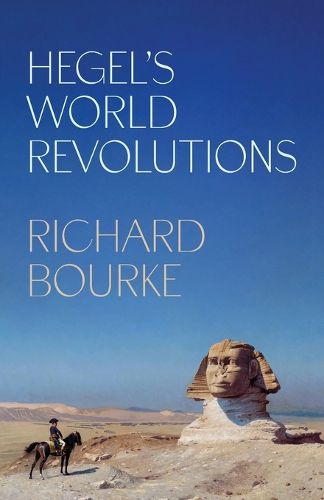Readings Newsletter
Become a Readings Member to make your shopping experience even easier.
Sign in or sign up for free!
You’re not far away from qualifying for FREE standard shipping within Australia
You’ve qualified for FREE standard shipping within Australia
The cart is loading…






G.W.F. Hegel was widely seen as the greatest philosopher of his age. Ever since, his work has shaped debates about issues as varied as religion, aesthetics and metaphysics. His most lasting contribution was his vision of history and politics. In Hegel's World Revolutions, Richard Bourke returns to Hegel's original arguments, clarifying their true import and illuminating their relevance to contemporary society. Bourke shows that central to Hegel's thought was his anatomy of the modern world.
On the one hand he claimed that modernity was a deliverance from subjection, but on the other he saw it as having unleashed the spirit of critical reflection. Bourke explores this predicament in terms of a series of world revolutions that Hegel believed had ushered in the rise of civil society and the emergence of the constitutional state.
Bourke interprets Hegel's thought, with particular reference to his philosophy of history, placing it in the context of his own time. He then recounts the reception of Hegel's political ideas, largely over the course of the twentieth century. Countering the postwar revolt against Hegel, Bourke argues that his disparagement by major philosophers has impoverished our approach to history and politics alike.
Challenging the condescension of leading thinkers - from Heidegger and Popper to Levi-Strauss and Foucault - the book revises prevailing views of the relationship between historical ideas and present circumstances.
'Few, if any, have got the gist of the Geist. Until now, that is. In Hegel's World Revolutions, Richard Bourke offers a major re-evaluation of not only Hegel's philosophy of history but also the history of his philosophy...To understand Hegel, you must read Bourke.' Daniel Johnson, The Critic
'Richard Bourke is a formidably talented political historian...Hegel's World Revolutions displays a knowledge of its protagonist's thought which may well be unequalled in Britain. Its mountain of secondary sources is just as impressive.' Terry Eagleton, London Review of Books
$9.00 standard shipping within Australia
FREE standard shipping within Australia for orders over $100.00
Express & International shipping calculated at checkout
G.W.F. Hegel was widely seen as the greatest philosopher of his age. Ever since, his work has shaped debates about issues as varied as religion, aesthetics and metaphysics. His most lasting contribution was his vision of history and politics. In Hegel's World Revolutions, Richard Bourke returns to Hegel's original arguments, clarifying their true import and illuminating their relevance to contemporary society. Bourke shows that central to Hegel's thought was his anatomy of the modern world.
On the one hand he claimed that modernity was a deliverance from subjection, but on the other he saw it as having unleashed the spirit of critical reflection. Bourke explores this predicament in terms of a series of world revolutions that Hegel believed had ushered in the rise of civil society and the emergence of the constitutional state.
Bourke interprets Hegel's thought, with particular reference to his philosophy of history, placing it in the context of his own time. He then recounts the reception of Hegel's political ideas, largely over the course of the twentieth century. Countering the postwar revolt against Hegel, Bourke argues that his disparagement by major philosophers has impoverished our approach to history and politics alike.
Challenging the condescension of leading thinkers - from Heidegger and Popper to Levi-Strauss and Foucault - the book revises prevailing views of the relationship between historical ideas and present circumstances.
'Few, if any, have got the gist of the Geist. Until now, that is. In Hegel's World Revolutions, Richard Bourke offers a major re-evaluation of not only Hegel's philosophy of history but also the history of his philosophy...To understand Hegel, you must read Bourke.' Daniel Johnson, The Critic
'Richard Bourke is a formidably talented political historian...Hegel's World Revolutions displays a knowledge of its protagonist's thought which may well be unequalled in Britain. Its mountain of secondary sources is just as impressive.' Terry Eagleton, London Review of Books